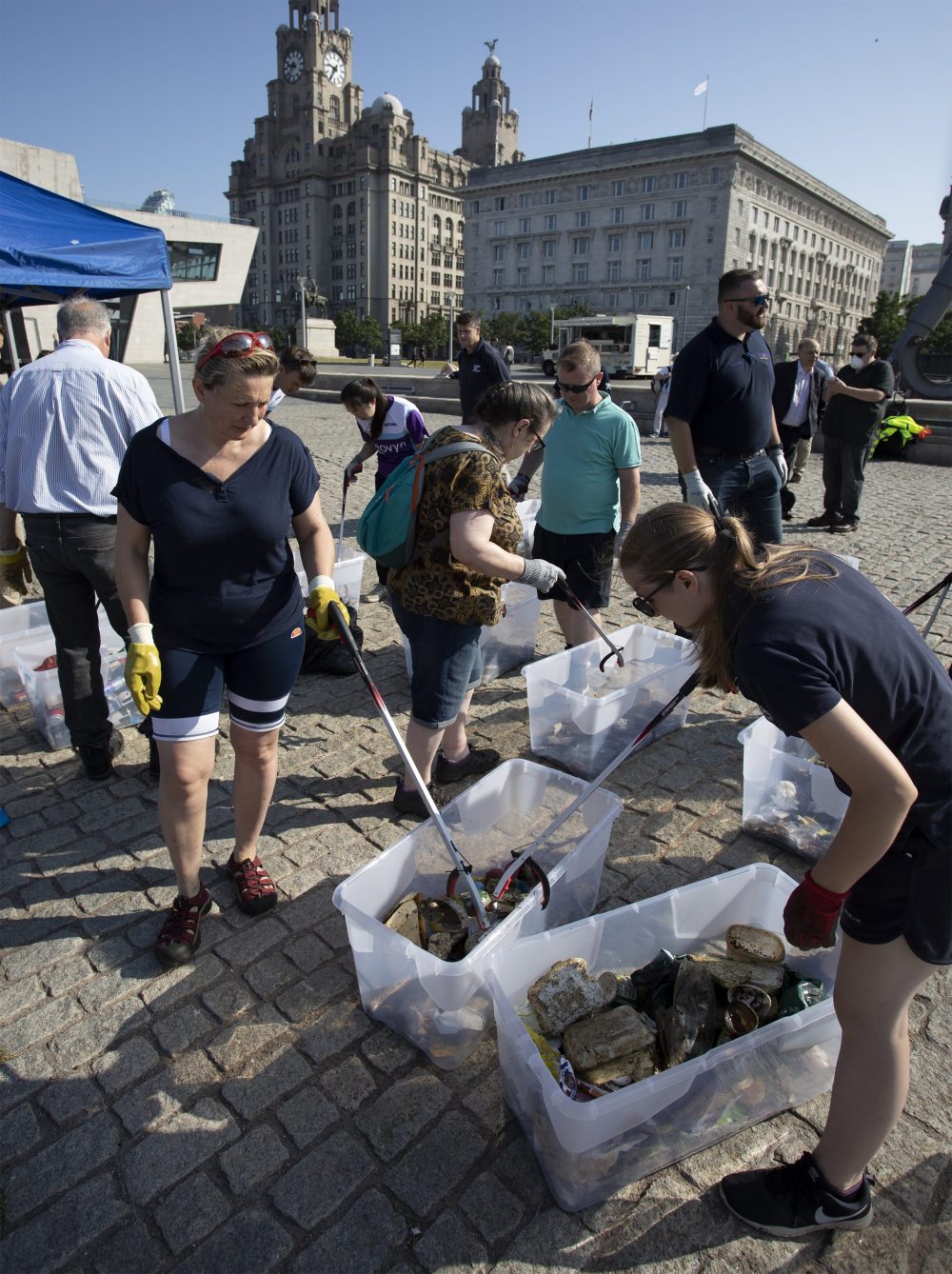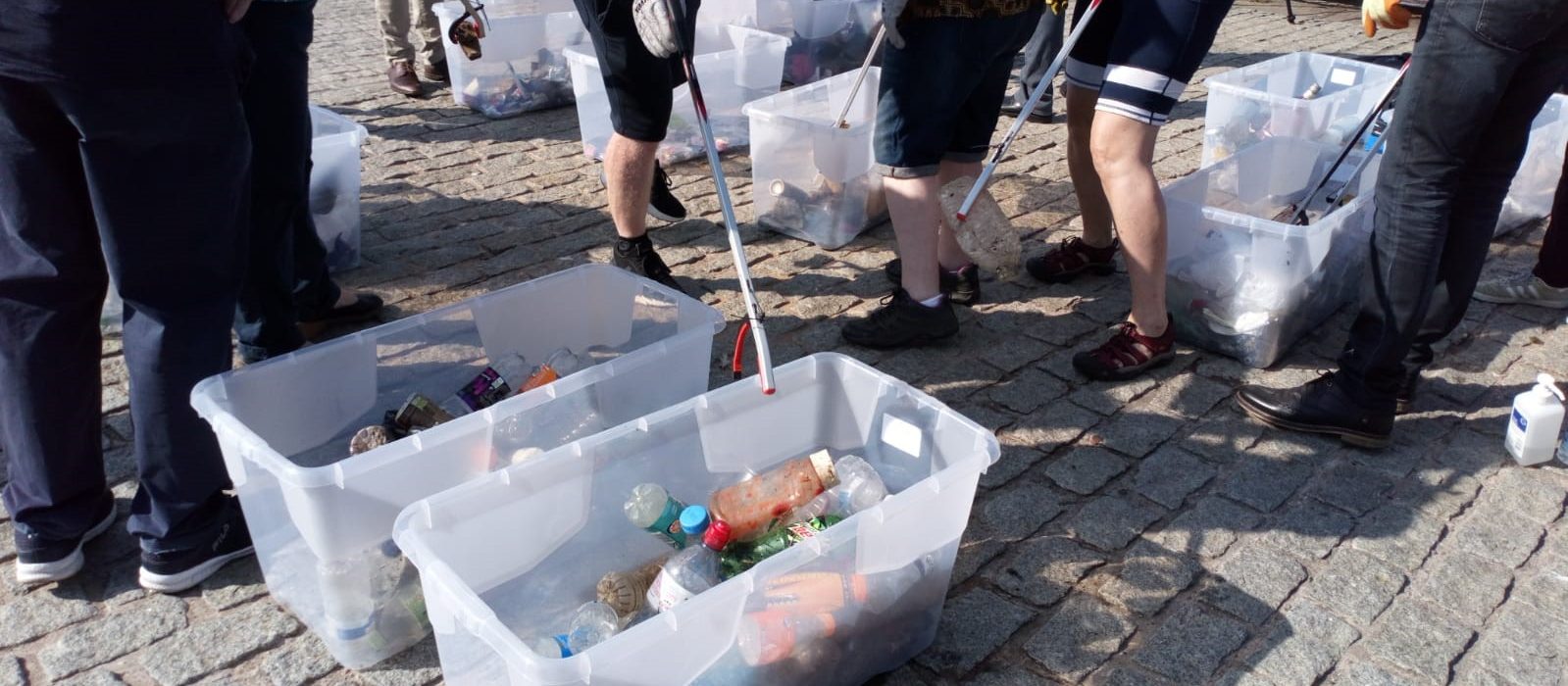Environment charities and industry join forces for Plastic Free Mersey
Two major rivers trusts are joining forces to work with communities, researchers, and businesses in the plastics supply and waste management chain to identify plastic litter types in the Mersey catchment.
The Plastic Free Mersey project will be led by the Mersey Rivers Trust (MRT) and Thames21. It will build on the London charity’s award-winning litter survey work, which has identified the most common plastic litter items on the Tidal Thames.
A launch event took place at the Royal Liver Building on the banks of the Mersey on Thursday July 22. Volunteers sorted previously collected litter into types, as a snapshot of the kinds of plastics in the River Mersey’s network of waterways. The launch received attention from BBC online and its regional television news programme, as well as ITV’s regional Granada television broadcast.
Each year, 900 Mersey River Trust volunteers collect roughly 1,000 bin bags of litter (weighing around five tonnes in total), much of it plastic. During the two-year project, trained volunteers will work as citizen scientists to sort, count and quantify plastic items they find at litter hotspots across the network of waterways, flowing from the Pennines to Liverpool Bay. The litter will be safely removed and disposed of correctly.
By collecting data and information on plastic and other litter and on people’s habits, the project will tackle how society uses and disposes of plastic. It will shape behaviour change to keep litter out of waterways, thereby reducing its impact on the natural environment.
The charities will work in collaboration with LyondellBasell, one of the world’s largest producers of plastics and chemicals, INOVYN, Europe’s leading producer of vinyls and SUEZ, a global expert in the water and waste sectors. All have company sites in the River Mersey catchment. The project also has the support of the British Plastics Federation and PlasticsEurope.
The project aims to create and test an effective model of co-operation between NGOs, researchers, and the plastics industry to tackle plastic pollution in waterways. This model can then be applied to other river catchments in the UK and abroad.

The most common types of light plastic litter identified by Thames21’s latest statistics on the Tidal Thames are:
- plastic food wrappers: 20%
- cotton bud sticks: 16%
- plastic drinks bottles or lids: 11%
- plastic cups: 4%
In addition:
- Single-use plastic items made up 83% of all counted items
The project will identify if similar statistics apply to the River Mersey’s waterways or if there is a different mix of plastic litter types.
The organisations involved in the Plastic Free Mersey project share the belief that plastic waste has no place in the environment. Using a cross-sectoral approach, they aim to protect the health of the river and its ecosystems.
John Sanders, Director at Mersey Rivers Trust, said: “We are delighted to have seen a massive improvement in ecology and water quality in the River Mersey over the past 30 years. Unfortunately, plastic pollution has increased over the same period. Recent research and media coverage has brought the issue of plastic pollution in the Mersey to the fore. It’s therefore fantastic that the Mersey Rivers Trust, Thames21 and the plastics and waste industries are now working together to create a project that identifies how plastic litter gets into our rivers. This will help us to protect the Mersey and the approach can be turned into a framework to help other rivers in the future.”
Debbie Leach, CEO of Thames21, said: “This is a hugely exciting initiative that will demonstrate very effectively how we can achieve much more by co-operating and working together, if we are to bring about real change to our rivers. Local residents will work together with local employees in the plastics and waste industries along the beautiful River Mersey towards their shared ambition of reducing plastic in the natural environment – supported by technical expertise of academia, industry and the environment sector. The results of this project will help shine a light on the way ahead.”
ENDS
Notes for editors
Quotes from organisations collaborating in the Plastic Free Mersey project:
Frank Rourke, INOVYN UK Country Manager,said: “The Plastic Free Mersey Project is a fantastic opportunity to bring together everyone who comes into contact with plastic, from manufacture through to everyday end use. We all have a responsibility to ourselves, the environment and future generations to ensure that we behave responsibly when using plastic. This project allows us to all make a difference, understand the issues and work together to transform and restore our local rivers back to healthy environments at the heart of our communities. We are excited and proud to be part of that.”
Leigh Broadhurst, Environment and Sustainable Development Lead for SUEZ recycling and recovery UK, said: “Passion for the environment is a core value for us and we help to reduce the environmental impact of our customers’ waste by recycling and extracting the value from it. We have a collective responsibility to ensure that our waste is managed correctly and we are pleased to support a project which aims to educate around plastic waste and restore the environment within our communities.”
Jim Seward, Senior Vice President R&D, Technology & Sustainability, at LyondellBasell,said: “The efforts of the Plastic Free Mersey Project align with our belief that ending plastic waste in the environment is a critical issue of our time. LyondellBasell is committed to helping eliminate plastic waste and we are pleased to support this collaborative effort, with direct action where it is needed most. Plastics are a valuable resource, even after they have been used. The value of non-recycled plastic that enters the environment, landfills or is incinerated globally is estimated to be £60 to £85 billion pounds annually. Working with other businesses and community stakeholders will help to keep plastics out of the environment and to enable focus on re-use, recovery and recycling.”
Adrian Whyle, PlasticsEurope Resource Efficiency Senior Manager, said: “PlasticsEurope strongly believes that we need to stem the flow of littered plastics into the aquatic environment and is proud to be a supporter of this first-of-its-kind collaborative action with industry, NGOs and citizens that will raise awareness, provide important research data and stimulate behaviour change.”
Adela Putinelu, British Plastics Federation (BPF) Senior Sustainability Executive, said: “The BPF is proud to support this unique initiative to tackle plastic litter and protect the health of rivers and ecosystems. Successful supply chain collaboration and multi-stakeholder partnerships such as this are key to stopping plastic waste needlessly ending up in the environment.”
Background information
- Thames21’s Thames River Watch project trains volunteers to count and quantify the types and amounts of plastic litter on the Tidal Thames. Its 2015-19 survey results can be found on the Thames21 website.
- The River Mersey has been identified as a microplastic litter hotspot in the UK (Hurley et al., 2018), along with all UK river channels.
- In 2019, the River Mersey was described in a study by Greenpeace and the University of Exeter as the UK river most contaminated with microplastics. Plastic Free Mersey will not focus on microplastics but types and quantities of larger plastic litter to help fill a knowledge gap on pollution sources and dynamics.
- LyondellBasell and INOVYN are active participants in the Operation Clean Sweep® (OCS) initiative, run in the UK by the British Plastics Federation, the nation’s leading plastic trade association, and Plastics Europe in their businesses on the continent.
- The OCS international initiative is designed to prevent the release of plastic granules (pellets, flakes and powders) into the environment during handling by the various parties in the plastics value chain. Companies signing up to OCS commit to improving worksites to prevent and address spills and to create and to publish internal procedures to achieve no industrial plastic material loss, among other points.
Launch event timeline on Thursday July 22, at The Royal Liver Building Pier Head, Liverpool, Merseyside, L3 1HU
0900-10.30am Speeches and litter sorting to announce the project
Anyone interested in volunteering as a “citizen scientist” can sign up to the initial online training scheduled for September 14, on the Thames21 website.
About Thames21
Thames21 connects people with rivers by putting healthy rivers back at the heart of everyday life. We improve and restore rivers, educate and empower the community and campaign for positive change for the good of people and the environment. www.thames21.org.uk | Registered Charity No. 1103997
The Mersey Rivers Trust is a charity working in partnership with all those interested in improving local rivers and waterways for people and wildlife. As a member of the national Rivers Trust movement, it is the Rivers Trust for the River Mersey and its catchment, covering Merseyside, Greater Manchester and much of Cheshire.
About INOVYN
Part of INEOS, INOVYN is Europe’s leading producer of vinyls and in the top three worldwide. With an annual turnover of €3.1 billion, INOVYN has circa 4,200 employees and manufacturing, sales and marketing operations in 8 countries across Europe.
INOVYN’s portfolio consists of an extensive range of class-leading products arranged across General Purpose Vinyls; Specialty Vinyls; Organic Chlorine Derivatives; Chlor Alkali; Sulphur Chemicals; Salt; and Electrochemical and Vinyls Technologies. INOVYN’s annual commercial production volume is circa 10 million tonnes.
INOVYN has 3 sites in the UK: Runcorn, Cheshire; Northwich, Cheshire; and Newton Aycliffe, County Durham.
LyondellBasell
LyondellBasell (NYSE: LYB) is one of the largest plastics, chemicals and refining companies in the world, with local facilities in Carrington and Warrington. Driven by its employees around the globe, LyondellBasell produces materials and products that are key to advancing solutions to modern challenges like enhancing food safety through lightweight and flexible packaging, protecting the purity of water supplies through stronger and more versatile pipes, improving the safety, comfort and fuel efficiency of many of the cars and trucks on the road, and ensuring the safe and effectivwe functionality in electronics and appliances. LyondellBasell sells products into more than 100 countries and is the world’s largest producer of polypropylene compounds and the largest licensor of polyolefin technologies.
SUEZ Recycling and Recovery UK
SUEZ Recycling and Recovery UK was established in the UK in 1988 as part of the global SUEZ group. We manage the waste sites on behalf of the Greater Manchester Combined Authority (GMCA), managing 1.1 million tonnes of waste arising from nearly 2.3 million residents. We help to reduce the environmental impact of our customers’ waste by recycling and extracting the value from it, putting Greater Manchester’s waste to good use. Our company’s diverse activities are guided by a vision to engineer a society where there is no more waste and our goal is to help create a circular economy in which nearly all waste materials are given a second life and reused, recycled or recovered for their energy content. Passion for the environment is a core value for us and we are proud to support efforts to keep our communities clean and tidy.
Several waste sites which SUEZ manage are located near the River Mersey
About the British Plastics Federation
Established in 1933, the British Plastics Federation is the UK’s leading trade association for the plastics industry, representing the entire supply chain, including raw material suppliers, manufacturers and recyclers.
PlasticsEurope is the pan-European association of plastics manufacturers with offices across Europe. For over 100 years, science and innovation has been the DNA that cuts across our industry. With close to 100 members producing over 90% of all polymers across Europe, we are the catalyst for the industry with a responsibility to openly engage with stakeholders and deliver solutions which are safe, circular and sustainable. We are committed to implementing long-term positive change.
Media Contact
Ian Lamont
Communications at Thames21
07711 701 696
020 7248 7171
